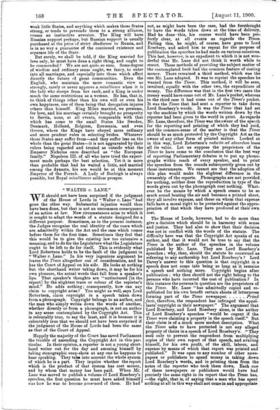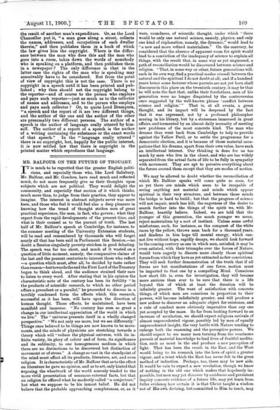"WALTER v. LANE."
'NATE should not have been surprised if the judgment of the House of Lords in "Walter v. Lane "had gone the other way. Substantial injustice would thus have been done, but that is not an uncommon consequence of an action at law. New circumstances arise to which it is sought to adapt the words of a statute designed for a different purpose. Sometimes, as in the present instance, the Judges recognise the real identity of the cases which are admittedly within the Act and the case which comes before them for the first time. Sometimes they feel that this would be to give the existing law too extensive a meaning, and to do for the Legislature what the Legislature ought to be left to do for itself. This is evidently what Lord Robertson holds to be the fault of the judgment in "'Walter v. Lane." In his very ingenious argument he leaves the Times altogether out of consideration, and he has the Court of Appeal on his side. He looks at nothing but the shorthand writer taking down, it may be for his own pleasure, the actual words that fall from a speaker's lips. That speaker's thoughts are "untinctured [in the report] by the slightest trace or colour of the reporter's mind.' He adds nothing; consequently, how can any claim to copyright arise? You might as well, says Lord Robertson, claim copyright in a speech taken down from a phonograph. Copyright belongs to an author, and the man who simply writes down the words of another, whether directly or from a phonograph, is not an author in any sense contemplated by the Copyright Act. This is colourably true, to say the least, and it is because it is colourably true that we should not have been surprised if the judgment of the House of Lords had been the same as that of the Court of Appeal.
Happily the majority of the Court has saved Parliament the trouble of amending the Copyright Act in this par- ticular. In their opinion, a reporter is not a young short- hand writer out for the day and amusing himself by taking stenographic snap-shots at any one he happens to hear speaking. They take into account the whole system of which he is a part. They inquire whether the report which is the product of that system has cost money, and by whom that money has been paid. When Mr. Lane was moved to publish a volume of Lord Rosebery's speeches, the first question he must have asked himself was how he was to become possossed of them. He had not, as might have been the case, had the forethought to have the words taken down at the time of delivery. Had he done • this, his course would have been. per- fectly clear, at all events as regards the Times. Failing this, he might, of course, have gone to Lord Rosebery, and asked him to repeat for the purpose of publication the speeches he had made on various occasions. This last, however, is an expedient to which it is not won- derful that Mr. Lane did not think it worth while to resort. These methods of providing the subject matter of the contemplated book had the common feature of costing money. There remained a third method, which was the one Mr. Lane adopted. It was to reprint the speeches he wanted from the Times. This method, it will be seen, involved, equally with the other two, the expenditure of money. The difference was that in the first two cases the money would have come out of Mr. Lane's-pocket; whereas in the third case it had come out of the Times's pocket. It was the Times that had sent a reporter to take down Lord Rosebery's words: It was the Times that had set up the machine by which the words written down by the reporter had been given to the world in print. As regards Mr. Lane, therefore, the Times was the owner of the speech for the reporting and printing of which they had paid, and the common-sense of the matter is that the Times should be as much protected by the Copyright Act as the owner of any other form of printed matter. Looked at in this way, Lord Robertson's reductio ad absurdum loses all its value. Let us suppose the proprietors of the Times to have come to the conclusion that the best way of reporting Parliamentary debates is to put up phono- graphs within reach of every speaker, and to print the speeches from the sounds subsequently given out by these instruments. We cannot see that the-adoption of this plan would make the slightest difference in the ownership of the reports. Phonographs are not provided for nothing, neither does the reproduction in type of the words given out by the phonograph cost nothing. What- ever be the means by which a speech ceases to be so much sound beating the air and becomes a printed sheet, they all involve expense, and those on whom that expense falls have a moral right to be protected against the appro- priation of that which they have produced at their own cost.
The House of Lords, however, had to do more than give a decision which should be in harmony with sense and justice. They had also to show that their decision was not in conflict with the words of the statute. The difficulty here was that the Copyright Act speaks of an author, and that it would not be true to say that the Times is the author of the speeches in the volume published by Mr. Lane. They are Lord Rosebery's speeches ; why, then, should the statute be construed as referring to any authorship but Lord Rosebery's ? Lord Davey's answer to this question is that copyright in a speech does not come into being so long as it remains a speech and nothing more. Copyright begins after. publication ; why then should not the right belong to the persons who have incurred the cost of publication ? In this instance the persons in question are the proprietors of the Times. Mr. Lane "has admittedly copied and re- published for his own benefit certain sheets of letterpress forming part of the Times newspaper Prim8 facie, therefore, the respondent has infringed the appel- lants' copyright in their newspaper." The argument that Lord Rosebery, and Lord Rosebery alone, is the author of Lord Rosebery's speeches "would be cogent if the Times were claiming a. property in the speech itself." But their claim is of a much more modest description. What the Times asks to have protected is not any alleged property of theirs in a speech of Lord Rosebery's. ." They seek only to prevent the respondent from multiplying copies of their own report of that speech, and availing himself, for his own profit, of the skill, labour, and expense by means of which that report was printed and published. It was open to any number of other news- papers or publishers to spend money in taking _down Lord Rosebery's words, and in printing them from the notes of the reporter who took them down. Each one of these newspapers or publishers would have had precisely the same right in its report that the Times has, —the right, that is, of saying that a man who has spent nothing at all in this way shall not come in and appropriate the result of another man's expenditure. Or, as the Lord Chancellor put it, "a man goes along a street, collects the names, addresses, and occupations of each dweller therein," and then publishes them in a book of which the law gives him the copyright. Where is the differ- ence between the man who does this and the man who goes into a room, takes down the words of somebody who is speaking on a platform, and then publishes them in. a newspaper ? The only difference is that in the latter case the rights of the man who is speaking may conceivably have to be considered. But from the point of view of copyright this is not the case. There is no copyright in a speech until it has been printed and pub- lished; why then should not the copyright belong to the reporter—and of course to the person who employs and pays such reporter—just as much as to the collector of names and addresses, and to the person who employs and pays such collector ? Or, to quote Lord Brampton, "a speech and the report of it are two different things, and the author of the one and the author of the other are presumably two different persons. The author of a speech is the author of language orally uttered by him- self. The author of a report of a speech is the author of a writing containing the substance or the exact words of that speech." In the "language orally uttered" there is no copyright, but, happily for the public interest, it is now settled law that there is copyright in the printed matter which reproduces that language.



































 Previous page
Previous page